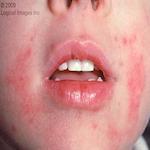I’m always keen on natural things that help children, but this recent study on melatonin and eczema does warrant some caution.
Melatonin is a naturally occurring hormone that most of us know, when taken before bed as a supplement, helps some people sleep. It is actually also quite a powerful antioxidant that can help repair and protect our mitochondria … the little power plants in our bodies that give us energy. This antioxidant potential is the proposed mechanism in researched support for some cancers.
In most of us, melatonin is produced by the conversion of tryptophan, the infamous turkey sedative, to serotonin during the day and melatonin at night. If we are under a lot of stress, or battling some inflammation or an infection, melatonin production can be highly blunted for the production of a more essential nutrient. Vitamin B3. Along with other products of the kynurenic acid pathway sequence, vitamin B3 is though to act in our brains as a possible antibiotic, sedative and support measure against inflammation and infections.
The warning however, for melatonin use in children comes with some literature showing that it can affect sexual development in larger doses that are commonly prescribed. As I see some medical doctors recommending melatonin at higher doses than naturally produced and have many parents giving melatonin to help kids sleep I think it is important for parents to know this fact.
There are tests for melatonin levels and kynurenic acid metabolites available that should always be considered before starting any treatments, especially in children.
Melatonin Aids Sleep, Eases Atopic Dermatitis in Children
By Megan Brooks on November 20, 2015
http://www.medscape.com/viewarticle/854739?nlid=91903_1842&src=wnl_edit_medp_wir&uac=158488MR&spon=17&impID=900273&faf=1
NEW YORK (Reuters Health) – Melatonin supplements are a safe and effective way to address sleep problems in children with atopic dermatitis, hint results of a clinical trial.
“Scratching in the night and sleep disturbance are always the major concerns for most of the atopic dermatitis children and their parents,” study investigator Dr. Bor-Luen Chiang, a professor at the Graduate Institute of Clinical Medicine, National Taiwan University, Taipei, told Reuters Health by email.
Reduced levels of nocturnal melatonin have been linked to sleep disturbance and increased disease severity in children with atopic dermatitis, Dr. Chiang and colleagues note in JAMA Pediatrics, online November 16.
They tested the effectiveness of melatonin supplementation in 48 children one to 18 years old with atopic dermatitis involving at least 5% of total body surface.
The study design had children take melatonin (3 mg/d) or placebo for four weeks followed by a two-week washout period and then cross over to the alternate treatment for four weeks. Thirty-eight children (79%) completed the crossover period.
Following melatonin treatment, the sleep-onset latency shortened by 21.4 minutes compared with placebo (p=0.02).
The severity of atopic dermatitis also improved after melatonin treatment, with a decrease in the Scoring Atopic Dermatitis (SCORAD) index of 9.1 compared with placebo (p<0.001), from a mean of 49.1 to 40.2. No adverse events were reported throughout the study.
“From our findings we believe that melatonin supplementation could be very helpful for the management of children with AD and sleep problems, especially those who have difficulty falling asleep,” Dr. Chiang told Reuters Health. “However, further studies are needed to find the optimal dose and duration of melatonin treatment for patients with AD.”
“We would also like to mention that although melatonin is available over the counter in many parts of the world, we would like to (advise) the parents to discuss with a doctor before putting kids with AD on melatonin. We would also like to remind the parents that while melatonin might be helpful, adequate control of the dermatitis (with their medication and moisturizers) is still crucial if they want to improve their sleep problems,” Dr. Chiang said.
Dr. Shalini Paruthi, spokesperson for the American Academy of Sleep Medicine, who was not involved in the study, told Reuters Health, “It’s very true that in kids with atopic dermatitis, you can often see them scratching while they are completely asleep. I have seen this in the sleep lab, so if there is any way that we can help them get better sleep quality and for longer periods, absolutely it might make a difference.”
Melatonin is “certainly a very important treatment that should be considered whenever children have trouble falling asleep, staying asleep, but I’m not sure it’s right for everybody. Melatonin works for people who are deficient in melatonin, but if you don’t have a melatonin deficiency to start with, then adding more is not likely to make a difference,” added Dr. Paruthi, director of the Pediatric Sleep and Research Center at Saint Louis University and SSM Cardinal Glennon Children’s Medical Center, St. Louis, Missouri.
She noted that in this study, all of the children had a two-week pretreatment period where they all kept a sleep diary, had a fixed sleep schedule and avoided caffeinated drinks. “There was a nice focus on sleep hygiene even before the study started. Sleep hygiene is very important and the more we make people aware of their sleep, the more they think about it,” Dr. Paruthi commented.
One question that often comes up, she noted, is how long a trial of melatonin should last. “There is not a good study on this, but my expert opinion would be that for a child who has difficulty falling asleep, try it for a couple of weeks, and if it makes absolutely no difference, then it’s probably time to talk to the pediatrician because that means there is probably something else going on,” Dr. Paruthi advised.
The study had no commercial funding and the authors have declared no conflicts of interest.
SOURCE: http://bit.ly/1j8o7tL
JAMA Pediatr 2015.
